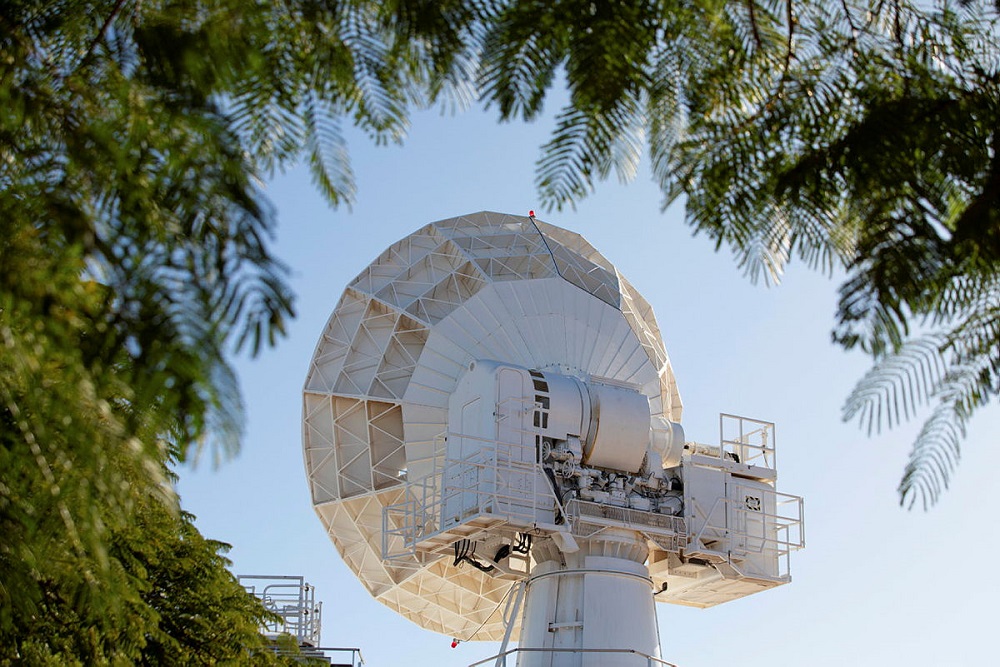
The establishment by Australia and its AUKUS partners, the United States and the United Kingdom, of a deep space advanced radar capability (DARC) will help them respond to the threat of attacks on their satellites and other equipment in space.
The DARC facility is scheduled to be operating at Exmouth in Western Australia by 2026 and will be followed by sites in the US and UK. Together, they’ll enable the three nations to monitor space activities more effectively out to the important geosynchronous orbit (GEO) 36,500 kilometres from earth. The Australian radar will complement existing space-surveillance systems at Exmouth, including a C-band radar system optimised to track objects in low-earth orbit (LEO) out to 1,500 kilometres and an optical surveillance telescope.
DARC will strengthen Australia’s role in space domain awareness under Operation Dyurra and our ability to share critical intelligence with our partners in the Five Eyes intelligence-sharing arrangement, along with France and Germany, under the 2014 combined space operations agreement.
The importance of ensuring that we know what’s happening in GEO can’t be overstated. The high-altitude orbit allows a satellite to match the earth’s rotational velocity and remain positioned above one point on the surface with minimal use of fuel. Satellites in lower altitudes orbit faster than the earth rotates, which means more satellites are needed to maintain constant coverage of one location.
For satellite communications, GEO is an ideal location to provide coverage to large regions. The Australian military satellite communications system to be acquired under Defence’s Joint Project 9102, with Lockheed Martin as the preferred bidder, will have up to four large satellites deployed to GEO, with initial operating capability from 2027.
Protecting satellites in GEO from counterspace attacks, and from the risk of collisions with debris in an increasingly congested domain, requires an ability to detect and monitor activities in orbit. China has demonstrated that it can undertake sophisticated rendezvous and proximity operations with its Shijian-21 satellite in GEO. In January last year, SJ-21 docked with a defunct Chinese BeiDou navigation satellite in GEO and towed it to 3,000 kilometres above the GEO belt.
Victoria Sampson from the Secure World Foundation noted that the SJ-21 activity can be interpreted as potentially responsible, but also potentially adversarial. She said China could be seen to be developing the capability to remove inactive satellites from orbit as a responsible space actor cleaning up debris. ‘Or you could use the lens that a lot of the US-based China watchers use and say that this could indicate that China is developing an on-orbit offensive capability,’ she said.
Certainly, having a dual-use capability such as SJ-21 means China can employ it responsibly to clear debris and reduce congestion. But it also gives Beijing a co-orbital anti-satellite capability that can be rapidly employed. It’s important for Australia and its partners to have the means to monitor possible dual-role systems such as SJ-21, particularly in critical orbits such as GEO.
DARC will expand Australia’s ability to monitor and detect potentially hostile actions in space, extending our gaze out to GEO. Greater situational awareness and an ability to track satellites similar to SJ-21 will enhance Australia’s ability to detect potential counterspace threats and, if necessary, take defensive action. Such a capability might emerge from the development of options for space electronic warfare under Defence Project 9358. It could also play an important role in ‘space control’ missions. In its 2022 space strategy, Defence says that it will continue to identify control gaps and opportunities to develop a credible space control capability consistent with its commitment to be a responsible actor in space.
Defence-operated space domain awareness capabilities will be combined with those of commercial providers. Examples are Australia’s HEO, which focuses on space-based space situational awareness; Electro-Optical Systems Australia; and US-based LEOLabs, which is establishing a network of ground-based space radar capabilities to monitor activity in LEO. One such station was established near Bunbury in Western Australia in early 2023. By building a network of radar and electro-optical sensors on earth and in orbit run by both Defence and commercial providers, Australia will be well positioned to play a key role in space.
The announcement that DARC is to be established under AUKUS is also significant because it closes a gap. The original AUKUS announcement in 2021 didn’t include space, even though it is crucial to many critical areas of military technology and defence missions, including maritime operations. Bringing the DARC capability into AUKUS establishes an important foundation for exploring further space-related missions and technologies under Pillar 2 of AUKUS.
Seeing deep into space to monitor potentially hostile activity and being able to attribute responsibility for irresponsible actions are the first steps in enhancing space deterrence.
It’s vital to reinforce efforts through legal and regulatory channels to reduce the risk of conflict in space. Yet such efforts alone won’t stop a potential adversary from building space weapons and using them in wartime.
Complementing legal and regulatory pressure with a credible space deterrence capability needs to become a high priority for Defence. That will demand an ability to deter by denial or punishment in response to threats, especially if adversaries choose to ignore legal and regulatory pressures, which is highly likely. The incorporation of DARC into AUKUS opens a more viable pathway for Australia, the UK and the US to prepare to more effectively meet the growing risk posed by counterspace threats.

